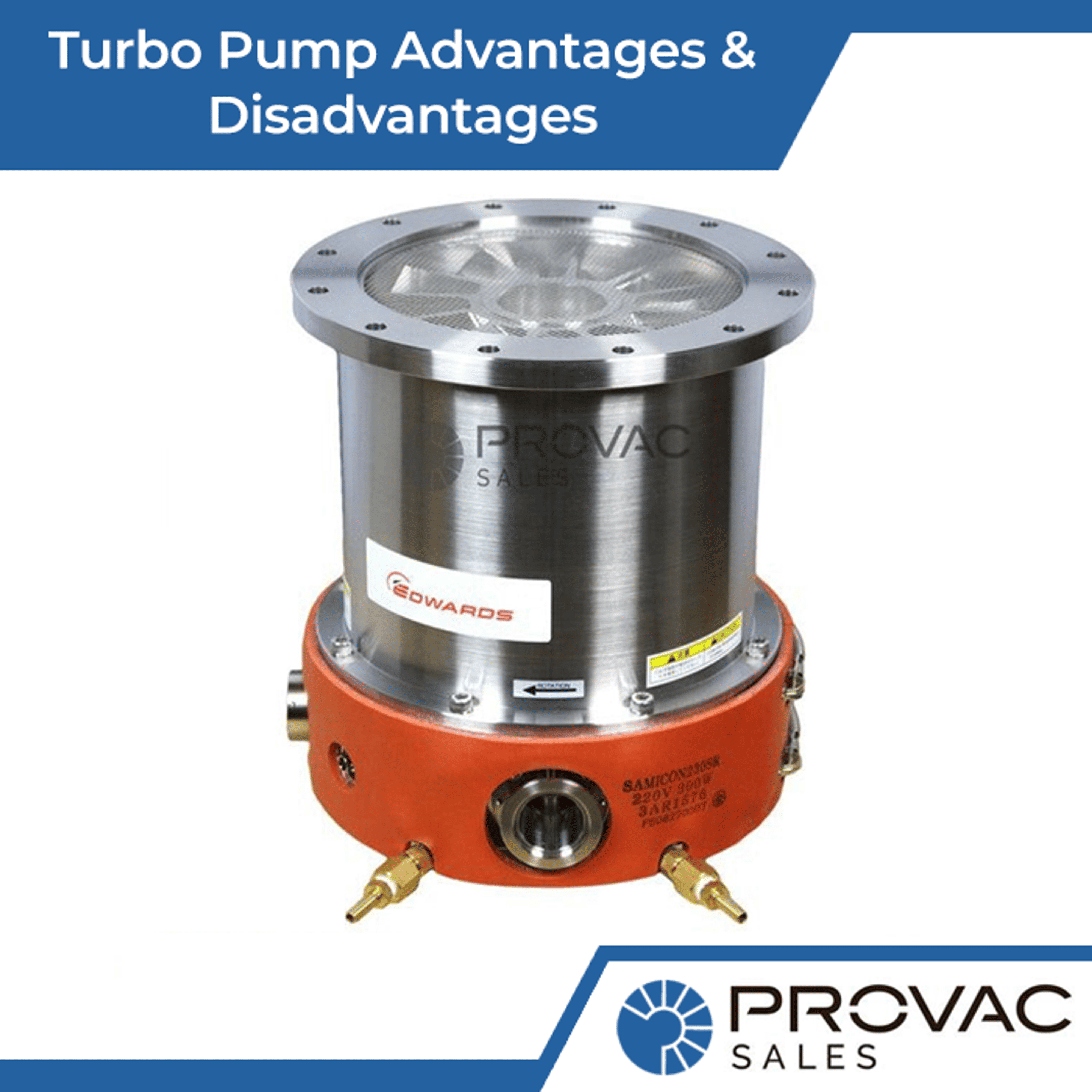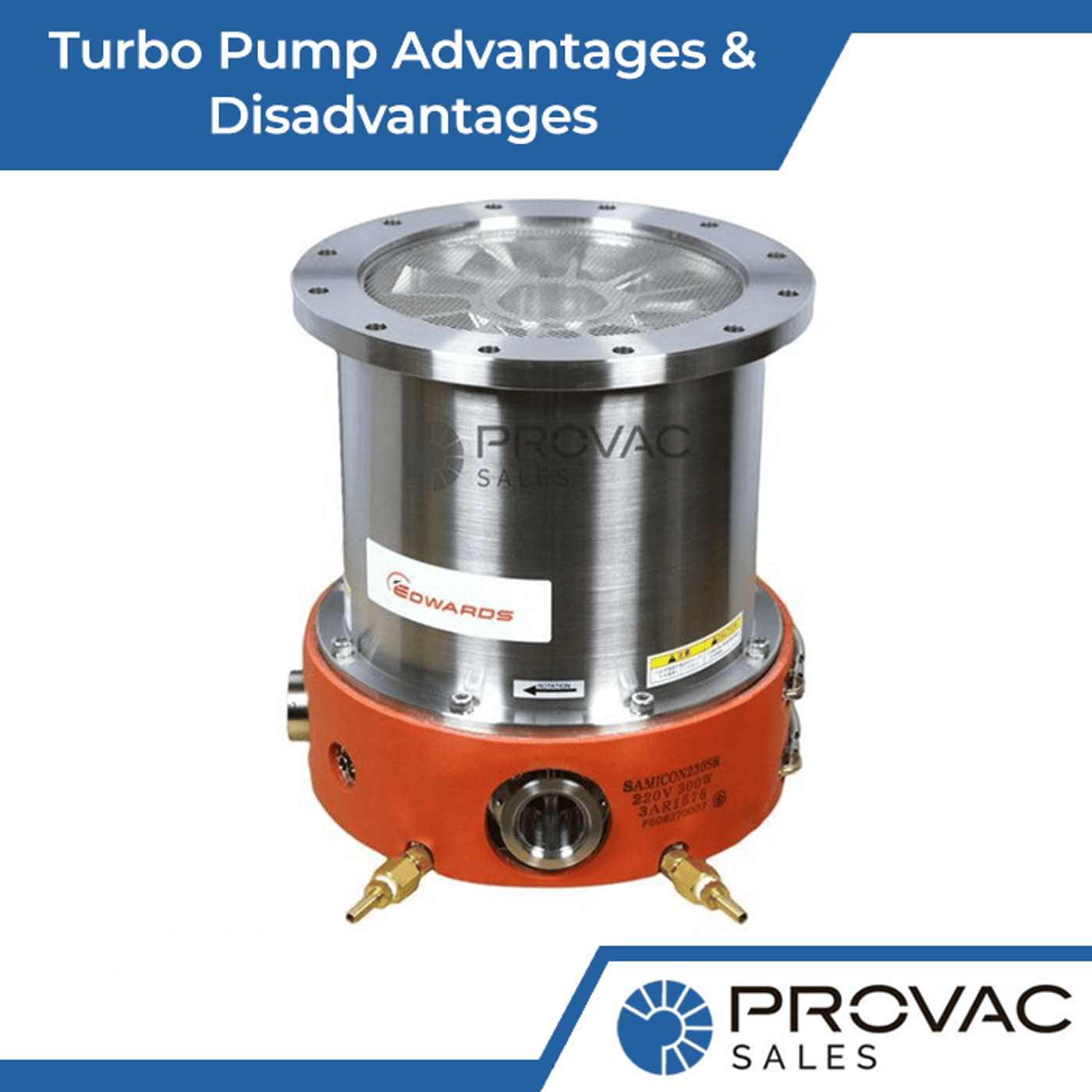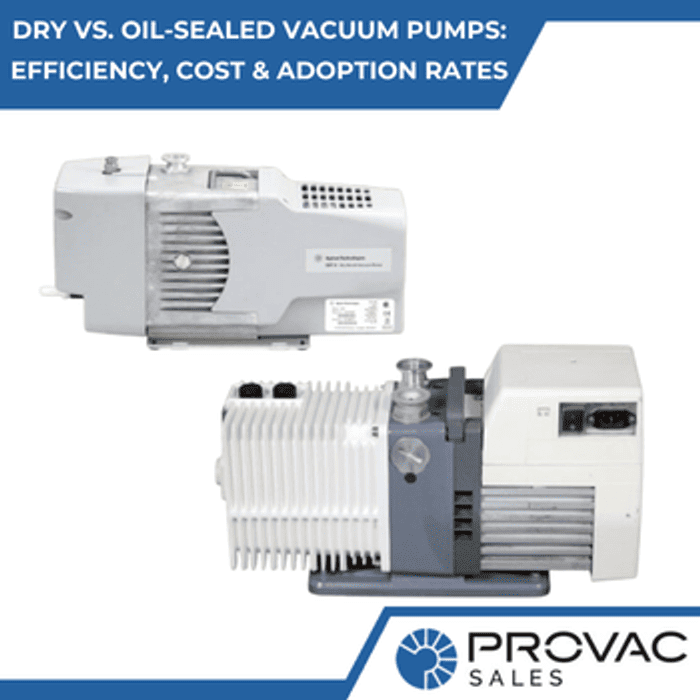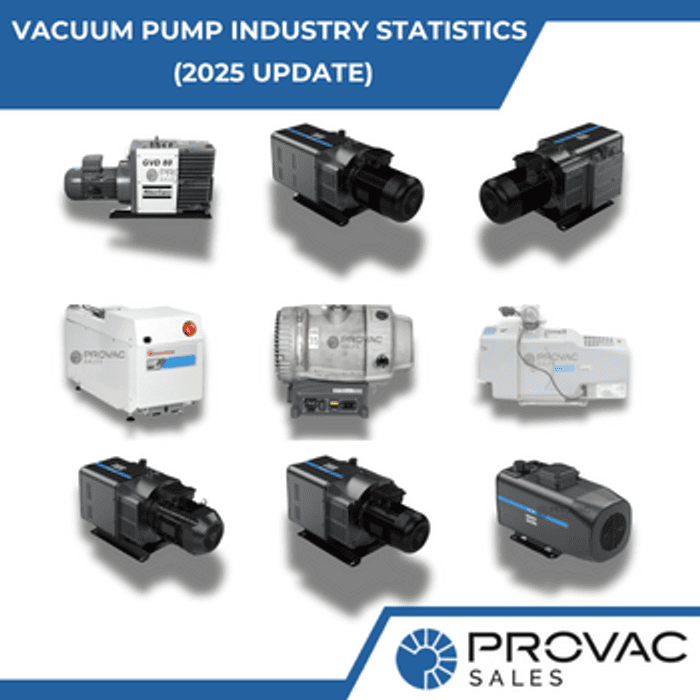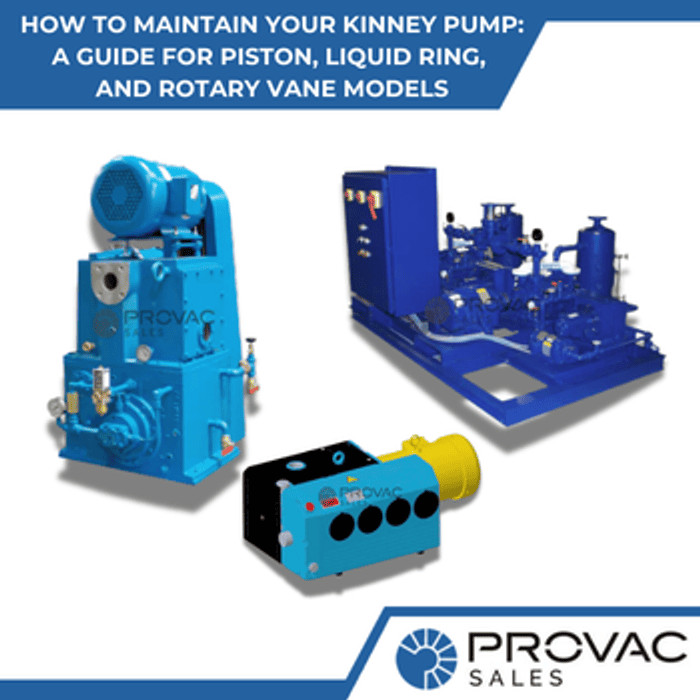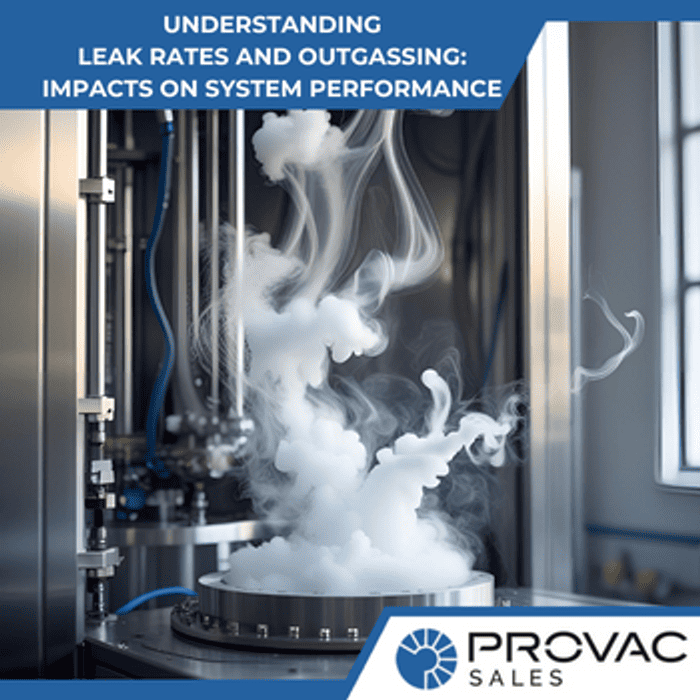Turbomolecular Pump Advantages & Disadvantages
Turbomolecular pumps, also called "turbo pumps," work on the principle of rapidly rotating blades. These blades create a molecular flow, making it possible to achieve ultra-high vacuum conditions. Their unmatched precision and efficiency have made them home in diverse sectors, from scientific research labs to semiconductor manufacturing.
What is a Turbomolecular Pump?
A turbomolecular pump is a vacuum pump that efficiently directs gas molecules out of the chamber using high-speed rotating blades. It achieves a superior vacuum level with minimal backstreaming, making it more effective than other vacuum pumps.
Your Trusted Partner in Vacuum Technology
Having been immersed in this industry for years, we at Provac Sales take pride in our expertise and the quality of our products. For those eager to learn more or even for seasoned pros looking to brush up on their knowledge, our turbo pumps FAQ is a treasure trove of information. We're both a supplier and your guide and companion in your vacuum technology journey.
Turbomolecular Pumps vs. Other Vacuum Pumps
In the expansive world of vacuum pumps, making an informed decision often boils down to understanding the distinct characteristics of each type. Among the variety, turbomolecular pumps have carved out a unique niche, setting them apart in several aspects.
How Turbomolecular Pumps Stand Out
Unlike other vacuum pumps, turbomolecular pumps use blade rotation to guide gas molecules out of a chamber. They create ultra-high vacuums, making them invaluable for specialized applications.
Explore Our Turbo Pumps Collection
For those intrigued by the nuances of turbomolecular pumps and keen on exploring the various models available, our turbo pumps collection offers a comprehensive overview. At Provac Sales, we've curated a range that caters to diverse needs, ensuring that every professional finds their perfect match.
Advantages of Turbomolecular Pumps
Adopting turbomolecular pumps across various industries isn't merely a trend; it's a testament to the advantages these pumps offer over their counterparts.
Unpacking the Benefits
- Ultra-High Vacuum Creation: Turbomolecular pumps can achieve vacuums in the 10^-9 to 10^-12 Torr range, often unattainable by other pump types.
- Reduced Backstreaming: Their molecular flow operation ensures minimal backstreaming, protecting sensitive applications from contamination.
- Quiet Operation: Unlike some pumps that can be noisy, turbo pumps operate quietly, making them suitable for labs and environments where noise can be disruptive.
- Efficiency & Longevity: With fewer wear-and-tear parts, these pumps often have longer operational lifespans and require less frequent maintenance.
Disadvantages and Limitations
As with any technology, while turbomolecular pumps offer numerous benefits, it's also essential to understand their potential limitations. Being informed ensures that users can make the most of these pumps without facing unexpected challenges.
Potential Drawbacks
- Limited Handling of High Gas Loads: Turbomolecular pumps are not designed to handle high gas loads, especially at their inlet. They require a forepump to manage this limitation.
- Sensitivity to Particulates: These pumps can be sensitive to dust and particulates, leading to reduced efficiency or even damage if not adequately addressed.
- Cost: The initial investment for a turbomolecular pump can be higher than other vacuum pump types, making evaluating the cost-benefit for specific applications essential.
- Operational Speed: They need to reach a high rotational speed before achieving their optimal vacuum, sometimes resulting in a longer start-up time.
Mitigating the Downsides
At Provac Sales, we always ensure our clients get the most out of their investments. Here are some suggestions:
- Pair with a Robust Forepump: A backing or forepump is required for use with a Turbo Pump; a robust forepump can manage high gas loads, ensuring the turbomolecular pump operates within its optimal range.
- Regular Maintenance: Scheduled cleaning and maintenance can reduce the risks of dust and particulates.
- Choose Wisely: Consider the specific needs of your application. Sometimes, the initial higher cost can be justified by the long-term benefits and reduced operational costs.
- Opt for Advanced Models: Some modern turbomolecular pumps have faster start-up times, ensuring quicker achieving desired vacuum levels.
Turbomolecular Pumps vs. Turbodrag Pumps
With high-vacuum pumps, it's common to encounter turbomolecular and turbodrag pumps. While they share similarities, understanding their differences is key to making an informed choice.
Distinguishing the Two
Turbomolecular pumps use purely kinetic motion, relying on rapidly rotating blades to direct gas molecules out of the chamber. Turbodrag pumps, on the other hand, combine molecular and viscous flow principles. This means they utilize both kinetic motion and viscous drag (resistance) to move gas molecules.
Some of the primary distinctions include:
- Efficiency Range: Turbodrag pumps can often start working efficiently at higher pressures than turbomolecular pumps.
- Design: Turbodrag pumps often combine straight and helical rotor blades, differing from the typical design of turbomolecular pumps.
- Operational Nuances: Turbodrag pumps can sometimes handle a bit more gas load than pure turbomolecular pumps, but this varies based on specific models.
Dive Deeper into the Comparison
We've curated a comprehensive comparison for readers eager to delve into the intricate details of how these two pump types measure against each other.
Explore our in-depth guide on turbomolecular vs. turbodrag to gain a clearer perspective.
Best Applications for Turbomolecular Pumps
Turbomolecular pumps have found their niche in various sectors due to their ability to produce ultra-high vacuums. Given their unique capabilities, certain applications are particularly well-suited for these pumps.
Applications Suited for Turbomolecular Pumps
- Semiconductor Manufacturing: Precision is paramount in semiconductor production, and turbomolecular pumps provide the clean, high-vacuum environments essential for processes like thin film deposition.
- Surface Science and Analysis: Techniques such as X-ray photoelectron spectroscopy (XPS) and Auger electron spectroscopy (AES) rely on high vacuums to analyze surfaces at the molecular level.
- Mass Spectrometry: A clean, high-vacuum environment is crucial for accurate molecular analysis without interference.
- Particle Accelerators: These require ultra-high vacuums to ensure unimpeded movement of accelerated particles.
- Free Electron Lasers: High vacuum conditions are essential to maintain beam quality and prevent beam scattering.
| Application | Compatibility with Turbomolecular Pumps |
| Semiconductor Manufacturing | High |
| Surface Science | Very High |
| Mass Spectrometry | Very High |
| Particle Accelerators | Extremely High |
| Free Electron Lasers | Extremely High |
Maintenance and Longevity Tips
Ensuring a turbomolecular pump's longevity and optimal operation goes beyond its initial setup. Regular maintenance and understanding the pump's operational nuances are key to maximizing its lifespan.
Tips for Prolonged Operation
- Regular Inspections: Conduct routine visual checks to identify any signs of wear, particularly in the bearings.
- Clean Intervals: Periodic cleaning ensures consistent performance, especially after any process contamination.
- Bearing Maintenance: For pumps with grease-lubricated bearings, regular re-lubrication is vital.
- Monitor Operating Conditions: Ensure the pump operates within specified temperature and pressure ranges.
Spotlight: Edwards STP-A1303CV Turbo Pump
Regarding reliability, the Edwards STP-A1303CV is an exemplary model in our collection. Its features include:
- Magnetic Levitation: This design eliminates lubrication, reducing wear and ensuring cleaner operation.
- High Pumping Speed: Efficiently maintains ultra-high vacuum conditions for various applications.
- Built-in Controller: Simplifies the setup and operation, reducing the need for external control units.
- Long Operational Life: Designed for durability, it promises extended service life with minimal maintenance.
At Provac Sales, we stand by the quality and performance of the Edwards STP-A1303CV, and it serves as a testament to what a top-tier turbomolecular pump can offer.
Myths and Misconceptions
Every technology, especially those as specialized as turbo pumps, has myths and misconceptions. As experts in the field, Provac Sales believes in empowering our clients with accurate information.
Debunking Common Myths
- Myth 1: Turbomolecular pumps can handle any amount of gas load.
- Fact: These pumps have a specific throughput limit. Exceeding this can lead to reduced efficiency or even damage. Using them in conjunction with a suitable forepump for optimal performance is essential.
- Myth 2: They are maintenance-free.
- Fact: While turbomolecular pumps are designed for longevity, regular inspection and maintenance are crucial for preserving operational efficiency.
- Myth 3: Turbomolecular pumps are suitable for all vacuum applications.
- Fact: While versatile, they excel in applications requiring ultra-high vacuums. For some processes, other pump types might be more appropriate.
We've got you covered if you have more questions or seek detailed insights into turbomolecular pumps. For all your vacuum pump needs, from questions to purchases, please contact us or call us at 831-462-8900, and someone will assist you.
